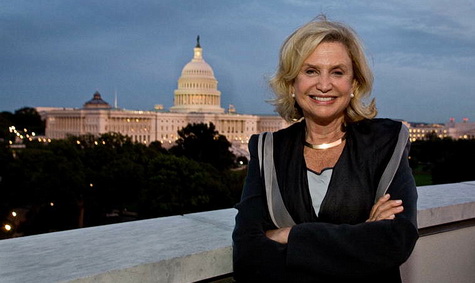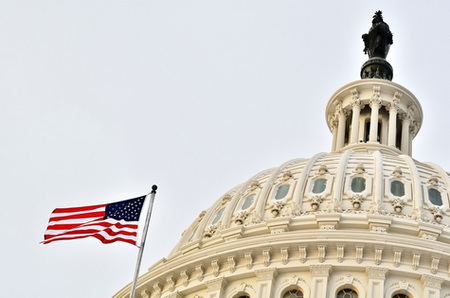
Commercial mortgage-backed security borrowers could face a historic wave of foreclosures starting this fall, impacting local communities and jobs across the country, without a long-term federal relief plan to combat liquidity deficiencies facing commercial real estate borrowers caused by the COVID-19 pandemic. That is the bipartisan message sent on June 22 to the Federal Reserve and Trump Administration by more than 100 members of Congress, who are seeking support for real estate borrowers unable to keep up with payments on debt tied to CMBS. (Wall Street Journal, June 23)
- The bipartisan letter acknowledges the existence of the Fed’s lending facilities, yet warns about “the looming crisis in commercial real estate adversely impacted by the COVID-19 pandemic, including the $540 billion Commercial Mortgage-Backed Security (CMBS) market that, if left unchecked, may lead to a wave of foreclosures, exacerbating the current downturn in the U.S. economy and ultimately result in permanent job loss in multiple industries and communities across the country.” (Congressional letter, June 22)
- The congressional letter also requests the Fed to “devise a relief plan for these borrowers, who through no fault of their own, have experienced a significant drop in revenue on account of the COVID-19 pandemic and related governmental orders.”
- Rep. Van Taylor (R-TX) is leading the effort to show policymakers the troubles faced by many hotels, shopping malls and office buildings that borrow money in the CMBS market – with some owners expressing concerns their properties could go to foreclosure. (Wall Street Journal, June 4)
- A June 26 letter from four national hotel trade associations to Treasury and the Fed emphasizes the unique pressures they face when pursuing loans using the Fed’s Main Street Lending Program (MSLP), which utilizes strict criteria based on Earnings Before Interest, Taxes, Depreciation and Amortization (EBITDA).
- The hoteliers detail multiple unnecessary obstacles in accessing desperately needed liquidity and how the industry’s asset-heavy business model shut them out from utilizing the MSLP because of the rigid EBITDA leverage test. “Most hotels are financed via mortgage debt, which means that their total outstanding debt is generally already above the maximum six-times EBITDA threshold established in the Main Street Lending Facility,” the letter notes.
- The hotel coalition letter also details specific “actions that would allow this critical industry access to liquidity to keep workers employed and help survive the crisis.”
- The Real Estate Roundtable and Nareit on April 22 wrote to Treasury Secretary Steven Mnuchin and Federal Reserve Chairman Jerome Powell urging that additional measures be adopted to expand the scope of the MSLP to forestall further disruption and economic dislocations in the commercial real estate sector during the pandemic. (MSLP comment letter, April 22)
- Previous industry letters to the Fed on March 24 and April 14 addressed the need to broaden the range of a separate credit facility – the Term Asset Backed Securities Facility (TALF). Those letters requested that TALF eligible collateral include both outstanding (legacy) CMBS, commercial mortgage loans and newly issued collateralized loan obligations. On April 9, the Fed confirmed that the TALF would be expanded to include triple-A rated legacy non-agency CMBS and loans.
- The Federal Reserve Bank of New York reported this week that the TALF had done $145,213,948 of “commercial mortgage” collateralized financing – legacy CMBS – out of a total of $252,155,890 of total volume, or 57.59%.
- Overall, the CMBS market over the next two years could see 13,000 loans totaling $148 billion go into default, according to a recent analysis by CoStar Risk Analytics. (CoStar News, April 30)
- Additionally Fitch reports that $21 billion of CMBS loans are now in Special Servicing due to the coronavirus pandemic’s impact on tenants and borrowers. This total is more than double the amount of CMBS loans that went into special servicing all of last year. (GlobeSt, June 23 and The Real Deal, June 22 and Fitch, June 17)
- Real Capital Analytics reports that the volume of deals for U.S. commercial properties including, offices and hotels, plummeted 79% in May compared with a year earlier. Deals to purchase hotels plunged 95% in May, the largest drop of any property type. Retail property transactions were down 83%. (BGov, June 25)
The June 22 congressional letter led by Rep.Taylor requests that Treasury and the Fed urgently consider targeted economic support to bridge the temporary liquidity deficiencies facing all commercial real estate borrowers. The letter concludes, “We believe an opportunity exists for responsible federal government investment in the commercial real estate market to provide a pathway to stabilize affected properties, the local jobs and businesses they enable, and the neighborhoods they serve.”
# # #






